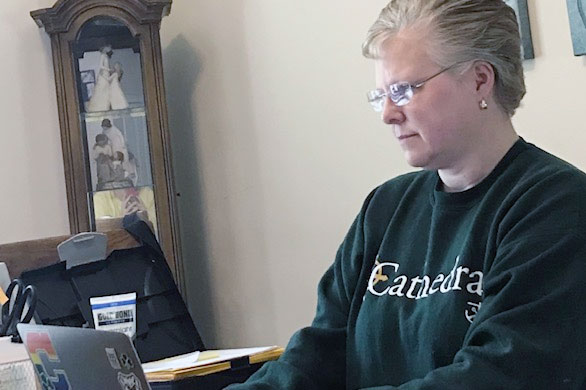Counselor issues college deadline reminders
Filling out the financial aid form is a key part of the process

Couselor Mrs. Kathy Pivonka said families should be aware of upcoming college admissions deadlines.
As college decisions roll out, the counseling department encourages seniors and their parents to be aware of financial aid application deadlines.
One of the Number-1 sources for scholarships, grants or government money is the Free Application for Federal Student Aid (FAFSA).
Counselor Ms. Kathy Pivonka said, “(The FAFSA) is what determines — at any college — any of the need-based aid that a student might get. And you have to renew it every year. It uses prior-prior taxes, so it’s not using the 2021 taxes. It’ll use the 2020 taxes.”
There are two deadlines for the FAFSA: the state deadline, April 15, and the federal deadline, June 30. Pivonka said this can sometimes be tricky for families to understand.
Pivonka said, “There are two different kinds of aid when you apply. You’ve got the state aid and then you’ve got the federal aid. The federal aid is things like work study on campus, federal loans, Pell grants, things like that. The state aid is through Indiana and it’s other kinds of state aid, like specific scholarships. Typically it’s harder to get state aid than federal aid. The sooner (the FAFSA is filled out), the better. If you wait until June, a school may say, ‘We’re out of these funds.’ It’s not too late to do it,” she said.
Sometimes there are certain circumstances that can cause slightly different procedures and requirements. Pivonka said, “If you’re in a situation where you have tons of medical bills or something like that in 2021, or if your family situation changes drastically, that’s when the federal form is mandatory for that kind of aid. Conversations with financial aid offices can also be helpful for students who might have specific situations for the colleges they’re looking at.”
Pivonka added that some families may feel certain that they will not receive any amount of financial aid. However, she said, “I think (the FAFSA) is a great safety net. There’s no magic to know what constitutes getting aid or not. I encourage everyone to fill (the FAFSA) out, especially in this day and age in the pandemic. If you file it by the deadline, it’s good for that whole year. So if your parents have figured out that they have the cost covered and they don’t think they’ll qualify for any financial aid, and something happens to their family income for any reason, if you have the FAFSA filled out by that June 30 date, then they can go back and look at it.”
There are several resources available for families who have questions or concerns regarding financial aid. Pivonka said, “College Goal Sunday is Feb. 27. It starts at 2 p.m. and there are 40 locations across Indiana. If you want to go get help with the FAFSA they have financial aid people where you can take your material and help them fill it out. They’ve also got some locations where they have Spanish as an option for students whose parents might need help translating.”
Finding all of the possible scholarships for a certain university can be overwhelming. Pivonka said, “We have sent out probably four emails this year with local opportunities. There is a whole set of links for all kinds of scholarship search engines. Looking at college’s financial aid pages to see if there are any scholarships you have not hit can be helpful in making sure you haven’t missed any opportunities. Even contacting a college’s financial aid office is not a bad idea, either. The worst they’re going to tell you is no. They can’t take away money that they’ve already given you.”
Pivonka added that students and their families should always look for scholarship opportunities in the future as well. “I always tell students to make sure they check second-year scholarships. There are things that change as you go through. Each year you have new opportunities for scholarships,” she said.
Now that the FAFSA has turned from paper to online, access to the form is easier. Pivonka said that one of these added advantages is the IRS data retrieval. “If parents opt in for the IRS data retrieval tool, you put your parents’ social security number, and you put yours in if you file taxes, then it will bring a lot of that information over,” she said.
After filling out the FAFSA, students will receive a financial aid package. Because these packets are filled with a multitude of information that may sound foreign to students and their families, Pivonka said, “I sit down and go through the different categories of financial aid with the students and describe what they are.”
Pivonka said, “Seniors always think they’re done with (their counselors) this time of year, but there’s still a lot to do with those (financial aid) packages. We’re still available to students. I encourage the current seniors to keep reaching out.”

Ashlynn Bakemeyer is a senior and the co-editor-in-chief of the Megaphone. At Cathedral she is involved in the Best Buddies Club. Outside of school she...






